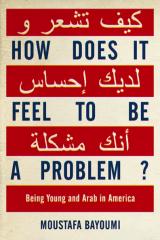my friend ruth peck urged me to listen to moustafa bayoumi’s interview on npr today.
bayoumi, who is professor of english at brooklyn college, the city university of new york and co-editor of “the edward said reader”, has written a book called “how does it feel to be a problem? being young and arab in america”. in mostly bayoumi’s own words, the book is a collection of stories about the lives of young arab and muslim americans post 9/11, about how they are forging lives for themselves in a country that often mistakes them for the enemy. arab and muslim americans are the new, largely undiscussed “problem” of american society, their lives no better understood than those of african americans a century ago. under the cover of the terrorist attacks, the wars in afghanistan and iraq, and the explosion of political violence around the world, the vilification of islam and muslims has become socially acceptable in america. no other group can be as easily maligned, with absolutely no protection from hate-speech or blatant racial profiling.
much of what bayoumi said in his interview is similar to the issues i discuss in my film “the muslims i know”. what surprised me were the questions that were directed at him. it still shocks me to find out what people really think about muslims – much of it is small-minded and ignorant, so generalized that it is quite meaningless, and so opposed to basic common sense that i do begin to feel “politically fatigued”. how many times can you answer the same vapid, stereotypical questions that are being constantly bounced around and kept alive by the media without despairing of ever being actually heard? for how long can you defend your humanity when the very language you are asked to use is slanted in favor of your interrogator? is it possible to make any kind of headway?
maybe the very fact that bayoumi was on npr is a step forward. it is good that we are airing our dirty laundry and that one in every four americans is admitting to anti-muslim bigotry. maybe confessing is a necessary prelude to change. maybe tolerance is the norm in america, we’ve just strayed too far away from the mean.

